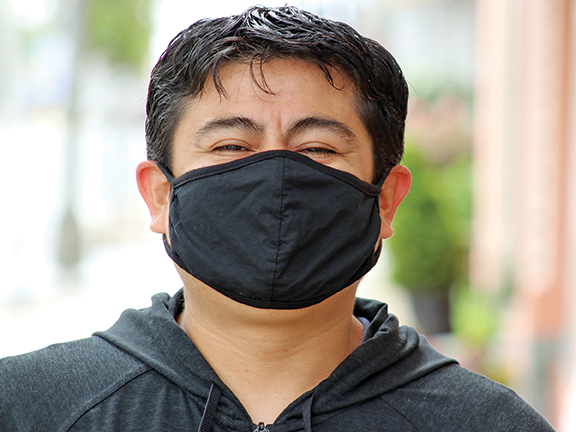Resort’s undocumented immigrants face the same trials and tribulations with COVID-19, and more
By BILL BARLOW /Special to the Sentinel
OCEAN CITY – Azel Vasquez came to Ocean City about 18 years ago, looking for work and a better life.
In many ways, he found what he was looking for.
His two children attend Ocean City schools. He likes his job at a downtown bakery. He’s part of a community. He recently celebrated his 35th birthday. But things are tough right now.
He’s seen his life disrupted, like most year-round residents of Ocean City and others around the world, by the COVID-19 pandemic and the economic downturn brought on by the shutdown aimed at slowing its spread. There is little work available.
For months, everything has stopped. He sometimes picks up some extra work at construction sites around town, but that work is also unavailable.
“My boss got a letter saying I can’t go to work, there are too many people working at the same house,” he said.
For Vasquez and many others in Ocean City’s Spanish-speaking community, there will be no federal stimulus check. He has no access to unemployment insurance or other state or federal programs, even though he pays state and federal taxes.
“Of course it’s affecting the whole country, but it’s more affecting us, not being a U.S. citizen, not having that Social Security number,” he said. “The president, Donald Trump, he’s helping people. We can’t get that help.”
Same problems, and more
Ocean City resident Alma Rodriguez still has some work in housekeeping at a local motel but while she used to have five days a week, she’s now getting two or three.
“I’m afraid of the virus, and I’m afraid about money,” she said, trying to make sure her three children have enough to eat. She was interviewed with the help of a translator.
Like Vasquez, many of her concerns are much like those of almost everyone else in the city and around the state. Her children can’t go to the playground and their routines have been disrupted. They’re too young to understand why.
“They don’t understand why there’s less food,” she said.
A local store that caters to the city’s Mexican community has helped out when she needs it, she said. There are other organizations that offer help without asking about immigration status. But she’s worried about the future, even as the weather warms.
Most years, work is plentiful in Ocean City in the summer. This year, many of the family-owned businesses that form the backbone of Ocean City’s economy are looking at a crushing drop in revenue. Most have been closed for months and even as Gov. Phil Murphy begins to ease some of the restrictions imposed by executive order, owners will be tightening their belts.
Growing community
A generation ago, there were few native Spanish speakers in Ocean City and even fewer from Mexico. That number has grown, with people drawn by abundant summer jobs. In 2010, the census showed 643 people who identified as Latino or Hispanic in Ocean City, 5.5 percent of the year-round population of 11,701.
That number may have increased in the decade since, and it may have been under-counted at the time. Studies show that many undocumented immigrants are afraid to answer the census. There are an estimated 10 million undocumented immigrants living in the United States.
A 2017 report to the Census Bureau found through focus groups that many immigrants fear responding to the census, a fear that appears to have grown as raids by Immigration and Customs Enforcement (ICE) have intensified and the national rhetoric on immigration has heated up.
The 2010 census found that most of Ocean City’s Spanish-speaking population is from Mexico, with 412 of those responding, and a significant portion are from Puerto Rico, an American territory whose residents are American citizens. Puerto Ricans have been a visible part of south Jersey life and culture for generations.
The census data show 24 Cubans and 73 people from other nations living in the city.
Rodriguez grew up in the Mexican state of Guerrero, on the Pacific. Vasquez is from a small village in mountainous Oaxaca, even farther south, where many people speak indigenous languages before they learn Spanish.
While Rodriguez still struggles with English, Vasquez has become fluent in his years in Ocean City.
“I’ve lived here pretty much since I was a kid,” Vasquez said. He also spent some time in California but now Ocean City is home.
“I love it here. It’s a great place to raise your kids. There’s a really good school,” he said.
He crossed the border as a teenager. At the time, it cost about $1,200 to pay the smugglers known as coyotes. Now, it’s about $10,000, he said.
By all accounts, the crossing has become far more dangerous as well as more expensive, with gangs preying on migrants on the route and in border towns, even before the new restrictions related to the coronavirus.
Vasquez went back to Mexico twice when he was young, visiting family before crossing the border again. That’s no longer feasible, he said. It’s been a decade since he’s seen his mother in person, he said, and video conferences over the internet just aren’t the same.
“I can’t just leave. If I leave, who’s going to support my family?” he said.
When normal comes back
Vasquez wants his children to meet their grandparents on both sides of the family. Born in the United States, his children are American citizens and will someday be able to visit Mexico on an American passport. But for now, he and his wife want to bring their parents here, on tourist visas.
“We want them to come here legally, not the way we came here,” he said. But the closed borders and financial hardship of the pandemic changed their plans.
“All of this happened and it just stopped everything,” he said. “That’s what the plan is now, when this is all over. We don’t know when it will happen.”
Health risks
Members of immigrant communities have less access to health care, are less likely to have health insurance and often have hourly or day-rate jobs that result in a financial hardship from sick days. An April piece by Allyssa M. G. Scheyer in the publication Jurist argues that COVID-19 compounds issues undocumented workers have confronted for years.
Many immigrants are incarcerated in crowded conditions or work low-wage jobs in the food industry that may put them at risk of contact with the coronavirus.
New Jersey has the nation’s third-largest share of undocumented immigrants. An April study found that while New Jersey does not track immigration status as part of its COVID-19 infection data, Latinos made up close to 30 percent of the positive tests at the time.
As of May 30, New Jersey reported 11,698 deaths related to COVID-19, and more than 160,000 confirmed cases. Hispanics amounted to 19.4 percent of New Jersey’s COVID deaths, or 2,125 individuals.
Sense of community
“Before COVID-19, a lot of people that didn’t have a job could go to the Wawa and get a side job for one day, two days. You can’t go in there now and wait for someone to say they need a guy today,” Vasquez said.
Everyone is handling the situation differently, he said. When his oldest daughter was born, he opened an account in her name, adding to it whenever he could.
“It’s for her college,” he said. “It’s for the things I didn’t have when I was young. I wanted something different for her, a better life for my kids.”
Vasquez talked to his landlord about holding off on the rent until things get moving again.
“There’s really nothing he can do. I have to use that money until I can get back to work. I will have to replace that money,” he said.
Local churches help, he said, not only with food but with presents for the children on Christmas.
But even the churches and food cupboards have been hit by the pandemic. Karin Rossi Gleason has been working with one of the Spanish-language churches in town on an informal basis to help make sure families have enough to eat.
“As always, when things like this happen, the marginalized become more marginalized,” she said. She started working with the Spanish-speaking community after Hurricane Sandy.
“Off and on through the years, we’ve stayed in touch,” she said. That continued when concern built over an agreement between the Cape May County Sheriff’s Department and ICE. Known as a 287(g) agreement, county officials said it would apply only to people brought to the county jail, but many opposed the agreement, which brought Cape May County into conflict with New Jersey’s attorney general.
Rossi-Gleason said her husband Rob got to know many of the Mexican-born day laborers when they were working on their home in Beesleys Point. She said she sought to reach out again during the pandemic.
She received some staples, including rice and beans, through a food cupboard in Upper Township and supplemented them with fresh produce. She’s communicated with the Ocean City Food Cupboard and with the organization OCNJ CARES.
“I imagine some people will say ‘why should we care about them? We have Americans that are out of work,’” she said. She argues that the community has a responsibility to all of its members.
Sense of hope
In the spring of 2018, Ocean City Police hosted an outreach event at the community building at Eighth Street and Haven Avenue for Spanish speakers in town. PBA Local 61 sprung for pizzas and there was a guest speaker. The central message was that the immigrant community can call on the Ocean City police when they need help.
“When someone comes to us with a problem, whether to report a crime or to make a complaint, that is our sole focus,” said Jay Prettyman. Then a captain, he’s since been promoted to police chief.
Rodriguez said she would not worry about calling the police to report a crime. She has lived in town for 15 years and feels at home in Ocean City, although she hopes things pick up soon now that hotels and motels were allowed to reopen this week under limits on capacity.
The bakery is also set to reopen, Vasquez said, giving him a chance for some income over the summer. It’s still difficult.
“The kids haven’t been out for two months. You just want to take care of your babies,” he said. He wears a mask when he leaves home. “We’ve got to look after our kids, like any other parent would do.”
He said he has faith in God and hope for the future.
“We’ll see what happens,” he said.
This story was funded through a grant from the Center for Cooperative Media, part of the School of Communications and Media at Montclair State University.


